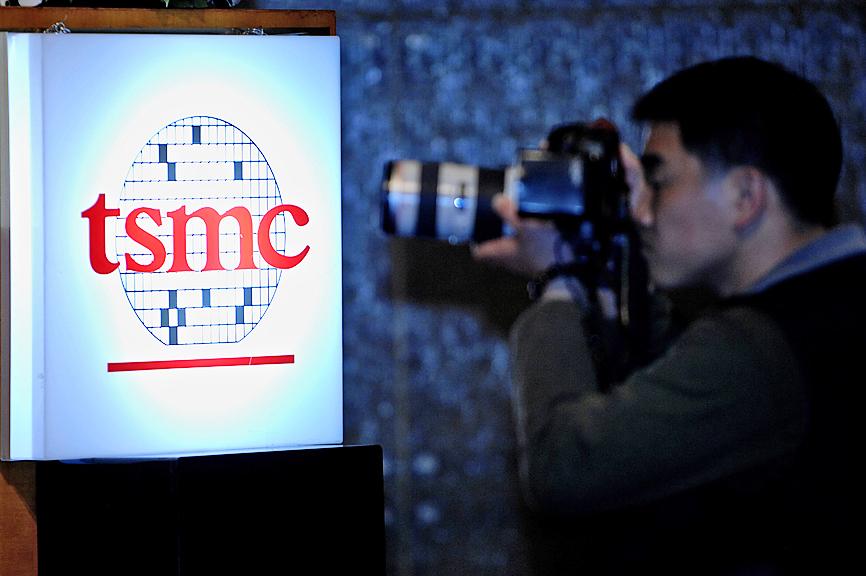Taiwan Semiconductor Manufacturing Co (TSMC, 台積電) has won the Corporate Innovation Award from the Institute of Electrical and Electronic Engineers (IEEE) for its leadership in 7-nanometer semiconductor foundry technology, the world’s biggest contract chipmaker said yesterday.
“TSMC’s technology leadership, paired with its foundry business model, meant that TSMC’s 7-nanometer technology marked the first time that the world’s most advanced logic technology was available to the entire semiconductor industry as an open platform,” TSMC chairman Mark Liu (劉德音) said in a statement.
Liu thanked the institute for recognizing TSMC with the award.

Photo: Sam Yeh, AFP
“It gives us further inspiration to continue finding new ways to unleash our customers’ innovations,” Liu said.
Since TSMC’s 7-nanometer technology entered volume production in April 2018, it has manufactured more than 1 billion dies to make hundreds of products for dozens of customers, the company said.
In the context of integrated circuits, a die is a small block of semiconducting material on which a functional circuit is fabricated.
The 7-nanometer technology has enabled IC designers to deliver innovations that would not otherwise be possible in critical technology areas such as artificial intelligence, data centers, advanced driver assistance systems, high-performance computing, 5G communications and smartphones, the statement said.
To support its customers with the broadest and most advanced portfolio of technologies, the firm invests about 8 percent of its revenue in research and development, devoting US$2.96 billion last year to areas including advanced logic processes, 3D IC system integration solutions and specialty processes, TSMC said.
Building on the successful 7-nanometer platform, TSMC brought its 5-nanometer process into mass production this year, and volume production of 3-nanometer semiconductors is scheduled to begin in 2022, the company said.
The New York-based IEEE has more than 400,000 members from 160 countries.
The IEEE Corporate Innovation Award, established in 1985, is presented annually to an industrial, governmental or academic entity, or other corporate body, to recognize outstanding and exemplary contributions in an IEEE field of interest.
Separately, the Hsinchu Science Park (新竹科學園區) on Monday honored TSMC founder Morris Chang (張忠謀) and three other technology pioneers for their contribution to Taiwan’s industrial development.
Hsinchu Science Park director general Wayne Wang (王永壯) said that a ceremony would be held on Tuesday next week to honor Chang, Acer Inc (宏碁) founder Stan Shih (施振榮), United Microelectronics Corp (聯電) founder Robert Tsao (曹興誠) and MediaTek Inc (聯發科) founder Tsai Ming-kai (蔡明介).
The ceremony is part of the 40th anniversary celebrations of the Hsinchu Science Park, which houses many of Taiwan’s major electronics exporting companies, including those of the four honorees, Wang said.

CHIP RACE: Three years of overbroad export controls drove foreign competitors to pursue their own AI chips, and ‘cost US taxpayers billions of dollars,’ Nvidia said China has figured out the US strategy for allowing it to buy Nvidia Corp’s H200s and is rejecting the artificial intelligence (AI) chip in favor of domestically developed semiconductors, White House AI adviser David Sacks said, citing news reports. US President Donald Trump on Monday said that he would allow shipments of Nvidia’s H200 chips to China, part of an administration effort backed by Sacks to challenge Chinese tech champions such as Huawei Technologies Co (華為) by bringing US competition to their home market. On Friday, Sacks signaled that he was uncertain about whether that approach would work. “They’re rejecting our chips,” Sacks

Taiwan’s exports soared 56 percent year-on-year to an all-time high of US$64.05 billion last month, propelled by surging global demand for artificial intelligence (AI), high-performance computing and cloud service infrastructure, the Ministry of Finance said yesterday. Department of Statistics Director-General Beatrice Tsai (蔡美娜) called the figure an unexpected upside surprise, citing a wave of technology orders from overseas customers alongside the usual year-end shopping season for technology products. Growth is likely to remain strong this month, she said, projecting a 40 percent to 45 percent expansion on an annual basis. The outperformance could prompt the Directorate-General of Budget, Accounting and

NATIONAL SECURITY: Intel’s testing of ACM tools despite US government control ‘highlights egregious gaps in US technology protection policies,’ a former official said Chipmaker Intel Corp has tested chipmaking tools this year from a toolmaker with deep roots in China and two overseas units that were targeted by US sanctions, according to two sources with direct knowledge of the matter. Intel, which fended off calls for its CEO’s resignation from US President Donald Trump in August over his alleged ties to China, got the tools from ACM Research Inc, a Fremont, California-based producer of chipmaking equipment. Two of ACM’s units, based in Shanghai and South Korea, were among a number of firms barred last year from receiving US technology over claims they have

BARRIERS: Gudeng’s chairman said it was unlikely that the US could replicate Taiwan’s science parks in Arizona, given its strict immigration policies and cultural differences Gudeng Precision Industrial Co (家登), which supplies wafer pods to the world’s major semiconductor firms, yesterday said it is in no rush to set up production in the US due to high costs. The company supplies its customers through a warehouse in Arizona jointly operated by TSS Holdings Ltd (德鑫控股), a joint holding of Gudeng and 17 Taiwanese firms in the semiconductor supply chain, including specialty plastic compounds producer Nytex Composites Co (耐特) and automated material handling system supplier Symtek Automation Asia Co (迅得). While the company has long been exploring the feasibility of setting up production in the US to address